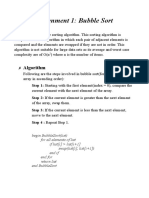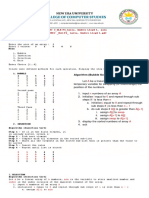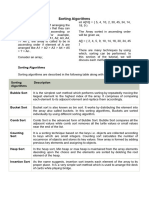0% found this document useful (0 votes)
5 views5 pagesCodescripts
The document provides implementations and explanations of four sorting algorithms: Bubble Sort, Insertion Sort, and Selection Sort, all of which have a quadratic time complexity of O(n^2) and are inefficient for large datasets. It also includes Binary Search and Linear Search algorithms, with Binary Search being efficient for sorted arrays. Each algorithm is accompanied by example code and a YouTube link for further learning.
Uploaded by
labortejian5Copyright
© © All Rights Reserved
We take content rights seriously. If you suspect this is your content, claim it here.
Available Formats
Download as TXT, PDF, TXT or read online on Scribd
0% found this document useful (0 votes)
5 views5 pagesCodescripts
The document provides implementations and explanations of four sorting algorithms: Bubble Sort, Insertion Sort, and Selection Sort, all of which have a quadratic time complexity of O(n^2) and are inefficient for large datasets. It also includes Binary Search and Linear Search algorithms, with Binary Search being efficient for sorted arrays. Each algorithm is accompanied by example code and a YouTube link for further learning.
Uploaded by
labortejian5Copyright
© © All Rights Reserved
We take content rights seriously. If you suspect this is your content, claim it here.
Available Formats
Download as TXT, PDF, TXT or read online on Scribd
/ 5






















































































